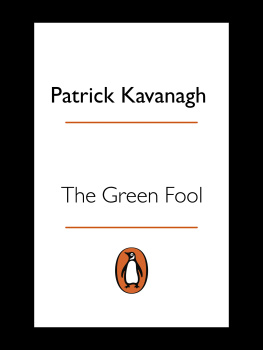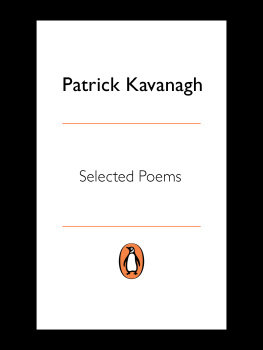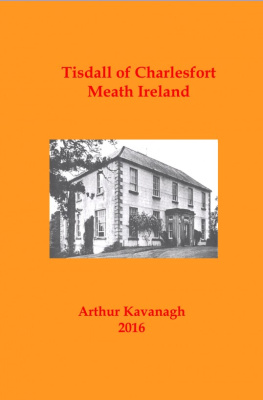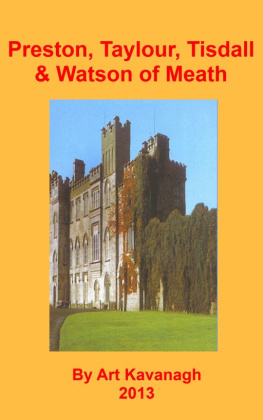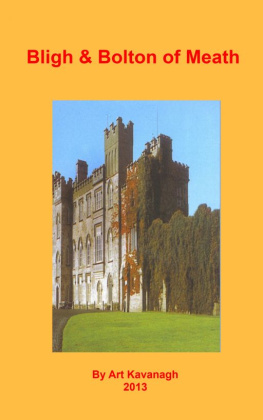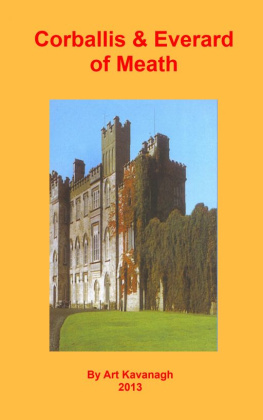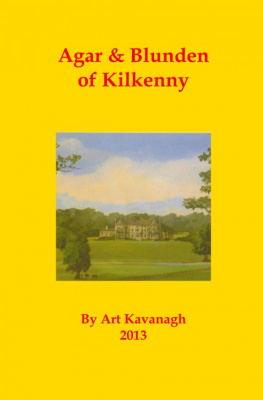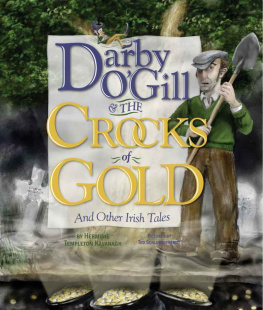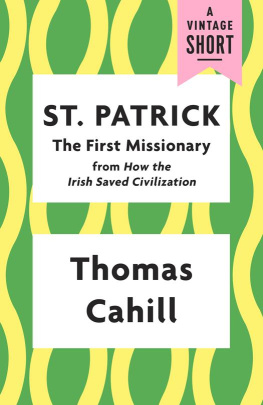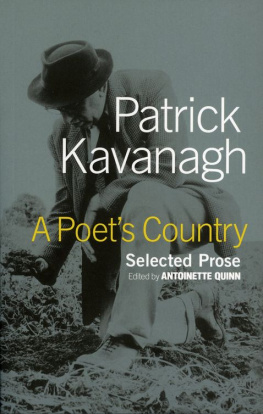PENGUIN BOOKS
The Green Fool
Patrick Kavanagh was born in Inniskeen, County Monaghan, in 1904, the son of a cobbler-cum-small farmer. He left school at the age of twelve, apparently destined to plough the stony-grey soil rather than write about it, but I dabbled in verse, he said, and it became my life. He was discovered by the Literary Revival veteran, AE (George Russell), in 1929 and his poems began to appear in Irish and English journals. In 1936 his first book of verse, Ploughman and Other Poems, was published, and in 1938 he followed this up with The Green Fool, an autobiography. He spent the lean years of the war in Dublin, where The Great Hunger was published in 1942. After the war he published the novel Tarry Flynn (1948) and two further collections of verse: A Soul for Sale (1947) and Come Dance with Kitty Stobling (1960). The bulk of his verse was included in his Collected Poems, and some of his prose in Collected Pruse. He died in 1967 and is buried in his native Inniskeen.
Patrick Kavanagh
The Green Fool

PENGUIN BOOKS
PENGUIN BOOKS
Published by the Penguin Group
Penguin Books Ltd, 80 Strand, London WC2R 0RL, England
Penguin Putnam Inc., 375 Hudson Street, New York, New York 10014, USA
Penguin Books Australia Ltd, 250 Camberwell Road, Camberwell, Victoria 3124, Australia
Penguin Books Canada Ltd, 10 Alcorn Avenue, Toronto, Ontario, Canada M4V 3B2
Penguin Books India (P) Ltd, 11 Community Centre, Panchsheel Park, New Delhi110 017, India
Penguin Books (NZ) Ltd, Cnr Rosedale and Airborne Roads, Albany, Auckland, New Zealand
Penguin Books (South Africa) (Pty) Ltd, 24 Sturdee Avenue, Rosebank 2196, South Africa
Penguin Books Ltd, Registered Offices: 80 Strand, London WC2R 0RL, England
www.penguin.com
First published by Michael Joseph 1938
This edition published by Martin Brian & OKeefe 1971
Published in Penguin Books 1975
Reprinted in Penguin Classics 2001
6
Copyright Katherine Kavanagh, 1971
All rights reserved
Except in the United States of America, this book is sold subject
to the condition that it shall not, by way of trade or otherwise, be lent,
re-sold, hired out, or otherwise circulated without the publishers
prior consent in any form of binding or cover other than that in
which it is published and without a similar condition including this
condition being imposed on the subsequent purchaser
EISBN: 9780141190747
Contents
TO MY BROTHER
1 Angelhood
When I was about two years old I was one evening lying in the onion-box that had been converted into a cradle. I looked up and saw for the first time the sticky black-oak couples of thatched roof. If I did not see stars it was my child observation was at fault for the blackbirds had pecked holes in the thatch to the very bone in places. The blackbird was a great enemy of old thatch and in its search for the little red worms in the decayed straw would stop at nothing. At three or four oclock of a summers morning he would begin his attack and by six, narrow sunbeam ribbons like wedding festoonery would be stretched from roof to floor in peasant homes, or as happened more often, spitting rain would startle the sleeping faces of children in their beds, and indeed I often heard father tell of a wet night when he had to hold an umbrella over himself and my mother in their bed.
The house where I was born was a traditional Irish cabin, wedge-shaped, to trick the western winds. It was surrounded on three sides by a neighbours field, which was inconvenient as unless we were on good terms with the owner of the field which we were not the back could not be thatched except by hanging a ladder across. It had a tiny back window, about a foot square, but through this window, it appears, we were not entitled to let in legal daylight. Once upon a time the owner of the field had built a cock of hay against the window, thereby leaving the occupants of the house in the plight of Diogenes when Alexander the Great cast his shadow on the bung-hole of the Sages tub.
The bog over which my young eyes strayed, and through which I often waded in the search for ducks that layed out, was a twenty-acre waste from which the peat had long been cut; in some of its clear pools greedy pike survived, but only the eels could be said to have security of tenure. Beautiful blue and white and pink flowers grew on the bog and more magical flowers I have not seen since; they were exciting as a poem and had a different beauty for my changing moods.
Around our house there stood little hills all tilled and tame. Yellow flame-blossoms of the whin lit bonfires all over the land-scape; the whin was as persistent and as fertile as sin and disease. The sunny side of the hills was good soil and boasted some tall thorn trees, but the black side facing the north was crabbed and poverty-stricken and grew only stunted blackthorns and sorrel plants. There were no trees to speak of except the poplar and the sally; here and there a cranky old elm which had survived the crying of a cold kitchen spread about his trunk and tried to look a forest. From the tops of the little hills there spread a view right back to the days of Saint Patrick and the druids. Slieve Gullion to the north fifteen miles distant, to the west the bewitched hills and forms of Donaghmoyne; eastward one could see the distillery chimney of Dundalk sending up its prosperous smoke, or, on a very bright day, one could see the sun-dazzled tide coming in at Annagasson. To the south stood the Hill of Mullacrew where once was held a fair famous as Donnybrook and it had as many cracked skulls to its credit too.
The name of my birthplace was Mucker; some of the natives wanted to change it to Summerhill which would have been worse. All who could do so without risking the loss of their scant mail cut Mucker out of their postal address altogether. The natives of the place were known far and near as Muckers, which in after years was rhymed obscenely by corner-boys. The name was a corrupted Gaelic word signifying a place where pigs were bred in abundance. Long before my arrival there was much aesthetic heart-aching among the folk who had to put up with, and up in, such a pig-named townland. In spite of all this the townland stuck to its title and it was in Mucker I was born.
Astrologers anxious to read my stars have now and then queried the hour and date of my birth. I always gave them somebody elses stars to read so that the horoscope mightnt put me out of humour with my dreams. But to those who may desire to cast for me my horoscope now I will say: My stars are events in time, things that happened and could not have happened to one born in the sixteenth century. The date of my birth is cut on the tablets of common existence.
The railway line to Carrick was visible from our back window. One hundred yards from our house was the railway gate-house and level-crossing where the Mucker Road joined the county highway. The railway was important: we set our clock by the three-thirty train. My father said the three-thirty was the only train you could depend on. It was the only train that had a connection to make. The other trains started just when the driver felt in the humour, and made no important connections except the pubs, where the driver, fireman, and guard quenched their smoky thirsts. We possessed the only clock in the townland. It was an old clock, father bought it second-hand for half a crown thirty years earlier, and the old woman from whom he bought it had herself bought it second-hand forty years earlier still. That clock was as touchy as a spoiled child; it would only go for father. Not even Jock Brickie, the wandering clock-repairer, could make it keep time. Once indeed father did let Jock try his hand at the old timepiece. Jock took it asunder. When he reassembled it there was one wheel for which the clock-repairer could find no place. He tried to fix the wheel in sideways, angle-wise, and turban-wise, and while so engaged the old clock started tick-tock, tick-tock.
Next page
